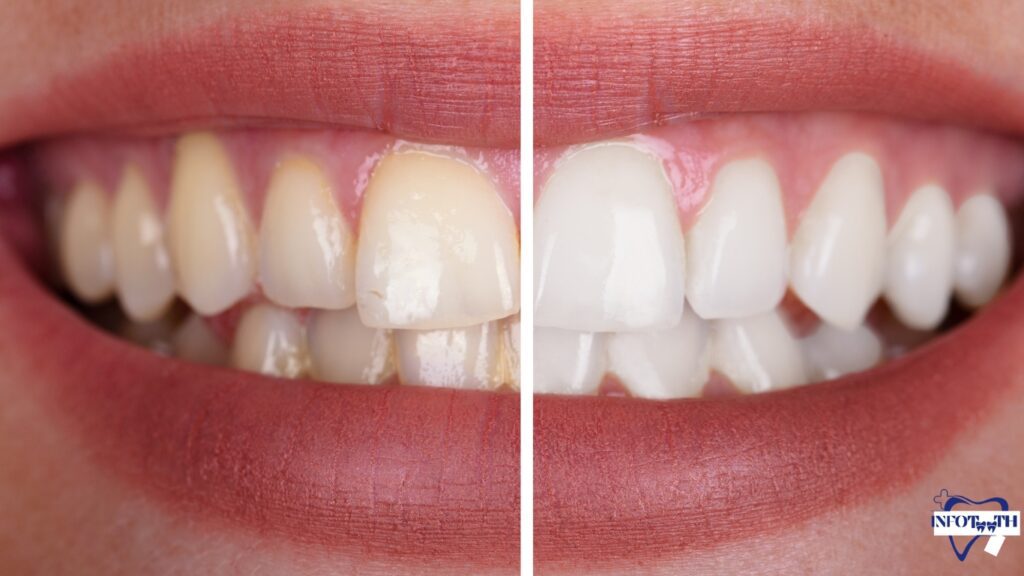If you find yourself saying, “I have really bad teeth what are my options?” you’re not alone in this concern. Embarking on a journey towards dental transformation begins with acknowledging the challenges of having bad teeth. In this article, we delve into the various options available to individuals grappling with dental issues. This article delves into the various solutions available for individuals facing significant dental challenges. From understanding the underlying issues to exploring professional advice, budget-friendly alternatives, and effective at-home care.
Table of Contents
Discover a comprehensive guide tailored to help you make informed decisions and embark on a journey toward reclaiming your oral well-being.
What Are The Signs And Symptoms Of Bad Teeth?
Bad teeth often manifest through distinct signs and symptoms, serving as crucial indicators for individuals seeking solutions to their dental challenges.
Toothaches are a common signal, causing persistent pain that may intensify during chewing or exposure to hot or cold substances. Bleeding gums during brushing or flossing indicate potential gum disease, a prevalent issue linked to poor dental health. Additionally, tooth sensitivity to hot or cold stimuli can suggest enamel erosion or dental decay.
The appearance of visible stains, discoloration, or cavities on the teeth is another prevalent symptom of dental deterioration. These visual cues not only impact aesthetics but also signify underlying oral health issues.
Beyond physical discomfort, bad teeth often contribute to persistent bad breath or halitosis. This condition arises from bacterial growth in the mouth, emphasizing the importance of addressing the root causes of dental problems.

In some cases, individuals may notice changes in the alignment or spacing of their teeth, indicating potential issues with tooth positioning or jaw alignment. Difficulty chewing or persistent jaw pain can accompany these changes, highlighting the functional implications of poor dental health.
Recognizing these signs and symptoms is the first step toward exploring viable options for dental improvement. Whether seeking professional advice, considering therapeutic procedures, or embracing at-home care practices, understanding the manifestations of bad teeth empowers individuals to make informed choices in their journey toward achieving optimal oral health and a confident smile.
Are Bad Teeth Genetic?
The relationship between bad teeth and genetics is a complex interplay of inherited factors that can influence dental health. While genetic predispositions may contribute to the susceptibility of certain dental issues, it’s essential to note that genetics alone do not determine the fate of one’s teeth. Understanding these genetic links can empower individuals to take proactive measures in their oral care.
However, genetics is only one reason. Lifestyle and environmental factors also play a pivotal role in the development of bad teeth. Poor oral hygiene practices, an unhealthy diet high in sugary foods, and tobacco use can exacerbate genetic predispositions. Regular dental check-ups become even more crucial for those with a family history of dental problems, as early detection and preventive measures can mitigate potential issues.
When exploring options for addressing bad teeth, individuals with a genetic predisposition should focus on a holistic approach. Seeking professional advice, maintaining a diligent oral hygiene routine, and adopting a tooth-friendly diet are essential steps. Understanding the genetic component provides valuable insights but doesn’t negate the impact of personal choices on oral health.
Dentistry-I Have Really Bad Teeth What Are My Options?
Dealing with dental issues is more than just a cosmetic concern; it’s about reclaiming your overall well-being. If you find yourself that “I have really bad teeth what are my options?” fear not – there’s a range of solutions available to restore your oral health and confidence.
Professional Dental Care:
Seeking advice from a qualified dentist is crucial. They can conduct a thorough examination, diagnose underlying issues, and recommend appropriate treatments. This may include dental cleanings, restorative procedures, and cosmetic dentistry.
Restorative Procedures:
For teeth that are damaged or decayed, various therapeutic options exist. Fillings, crowns, and root canals are common procedures aimed at preserving the tooth’s structure and functionality.
Cosmetic Dentistry:
If you are considering that “I have really bad teeth what are my options?” Cosmetic dentistry is best method because it focuses on the good look of teeth. Teeth whitening, veneers, and orthodontic treatments can transform the visual aspect of your smile.

Budget-Friendly Solutions:
Financial constraints should not hinder access to dental care. Investigate dental insurance plans that can assist with covering costs. Additionally, government assistance programs and low-cost dental clinics cater to individuals seeking affordable yet quality dental treatments.
Dietary Changes:
If you are worries “I have really bad teeth what are my options?” So choosing a teeth-friendly diet and less sugar can prevent next decay of Oral health. Nutrition plays a vital role in supporting overall oral well-being.
Overcoming Dental Anxiety:
Acknowledge and address any fears or anxiety related to dental visits. Open communication with your dentist and exploring relaxation techniques can make the experience more comfortable.
By considering these options and taking proactive steps, individuals with bad teeth can embark on a journey towards improved oral health, enhanced aesthetics, and a confident smile.
How To Fix Bad Teeth And Gums?
“I have really bad teeth what are my options?” – there are effective solutions to revitalize your oral health. Understanding the severity of your dental issues is the first step. For those with compromised teeth and gums, a multi-faceted approach is often necessary.
Addressing bad teeth and gums is crucial for overall oral health. The first step involves a comprehensive dental examination to identify underlying issues. Professional dental cleanings remove plaque and tartar buildup, preventing decay and gum disease. For damaged teeth, restorative procedures like fillings or crowns may be recommended.
Gum issues often require specialized care. Scaling and root planning can treat gum disease by cleaning the teeth and roots. Antibiotics may be prescribed to control infection. Advanced cases may involve surgical interventions like gum grafts.
At-home care is equally vital. Brushing twice daily with fluoride toothpaste, flossing, and using an antiseptic mouthwash help maintain oral hygiene. A balanced diet low in sugary foods contributes to healthier teeth and gums. Regular dental check-ups enable early detection of potential issues.
Ultimately, a multi-faceted approach combining professional intervention, at-home care, and preventive measures ensures the most effective treatment for bad teeth and gums. It’s essential to consult with a qualified dentist to tailor a treatment plan based on individual needs, promoting long-term oral health and a confident smile.
Bad Teeth Before And After
“I have really bad teeth what are my options?” So you are not single. Bad teeth can significantly impact one’s life, both physically and emotionally. Before seeking treatment, individuals often endure pain, discomfort, and reduced functionality. Aesthetically, stained or misaligned teeth can lead to self-consciousness, affecting social interactions and confidence. The emotional toll is immense, with dental issues often causing anxiety and avoidance of essential oral care.
However, the transformative power of dental intervention is remarkable. After undergoing appropriate treatments, individuals experience a profound change. The physical relief is evident as pain diminishes and functionality is restored. Aesthetically, the improvement is striking – teeth whitening, orthodontic procedures, and other interventions contribute to a radiant and confident smile. “I Have Really Bad Teeth What Are My Options?” This question rises when people think about it.

Dental procedures not only address immediate issues but also prevent potential complications. Regular check-ups and maintenance ensure long-term oral health. The before-and-after journey represents not just a cosmetic upgrade but a holistic improvement in one’s quality of life. It showcases the resilience of the human spirit, the power of modern dentistry, and the possibility of regaining not only a dazzling smile but also the confidence to embrace life fully. The journey from bad teeth to a revitalized, healthier state is a testament to the transformative potential of dental care, offering individuals a new lease on their oral well-being and overall happiness.
Conclusion
In conclusion, the journey from your thought “I have really bad teeth what are my options?” leading to conclusion that bad teeth to informed choices unveils a path to renewed oral well-being. By understanding the causes, seeking professional guidance, and exploring viable options, individuals can reclaim their smiles. Embracing preventive measures, lifestyle changes, and a positive mindset ensures a long-term commitment to oral health. Remember, the options are diverse and accessible, offering hope and transformation for those looking to overcome the challenges of bad teeth. Your journey towards a healthier smile starts with informed decisions.
FAQs
Q: What immediate steps if I have really bad teeth what are my options?
A: This FAQ addresses the urgency and initial actions someone can undertake when facing severe dental issues.
Q: How often should I visit the dentist for routine check-ups if I have bad teeth?
A: Exploring the frequency of dental check-ups is crucial for ongoing maintenance and preventive care.
Q: Can poor dental health be genetic, and how does it impact treatment options?
A: Addressing the role of genetics in dental issues and understanding its implications on available treatment choices.
Q: Are at-home teeth whitening products safe for individuals with bad teeth?
A: This FAQ provides insights into the safety of common at-home dental care products for those with compromised oral health.
Q: Is dental anxiety common, and what strategies can help overcome it during treatments?
A: Discussing the prevalence of dental anxiety and offering practical strategies for managing and overcoming fear during dental procedures.

